- Home
- Chris Wraight
Battle Of The Fang Page 8
Battle Of The Fang Read online
Page 8
He turned to the row of console runes that he’d been ignoring for the past ten minutes. All still red. Technically, that meant the ship was almost certainly doomed. If it didn’t shake apart in normal space, then the warp would probably finish it. No shields, no weapons, shedding atmosphere and with nine decks on fire. Not a happy state to be in.
‘I’ll take it,’ said Blackwing aloud, unable to shake off his gruesome smile. ‘Blood of Russ, I’ll take it.’
The Skraemar was an ancient, powerful warship, tempered in the long decades of the Great Scouring and bearing the scars of a hundred conflicts since. Some of her encounters had gained sector-wide fame: she’d defied a whole squadron of the Archenemy for two weeks in the Aemnon Belt until heavy support could arrive to turn the engagement, had taken out the much larger eldar Corsair flagship the Or-Iladril, and had led the breaking of the blockade of Pielos V at the tip of a desperately underpowered Imperial Navy spearhead. Her machine-spirit was old and star-cunning, and every inch of her machinations was known by her Iron Priest Beorth Rig. She was fast, packed a deadly punch, and didn’t die easily.
So when she did die at last, isolated in high orbit above Fenris and surrounded by foes, the death was not quick. There was no sudden warp-core breach, no decisive detonation of promethium tanks. She was cut in a thousand places, broken open by a million separate stabs of white-hot las-fire, raked by a score of torpedo impacts and turned black by clouds of burning plasma. They kept coming at her, wave after wave of gunships, dancing around the crushing columns of spitting energy thrown through the void by the looming battleships.
The Skraemar never stopped firing, even at the end. With her hull cracked, leaking fire and blood, she wallowed in a tide of incoming ordnance, swivelling on broken engines to maintain a firing lock on the Thousand Sons warships around her. With her frigate escorts all turned to atoms and the last dregs of the orbital grid collapsing in smoke and sparks, she was alone, a single gunmetal-grey island in a swarm of sapphire and gold.
The Skraemar’s forward batteries thundered a final time, sending a torrent of whip-fast, spitting hatred toward a wounded Sons destroyer, the Staff of Khomek. All of her remaining power had been put into the volley. It ripped the enemy vessel apart from prow to stern, shattering the void shields with pure, overwhelming power.
The Staff of Khomek was a minor kill, joining the Achaeonical, the Numeratory and the Fulcrumesque in oblivion. The Skraemar had exacted a heavy toll with its defiance, but the end was coming quickly. Gliding through the tide of gently spinning scrap like a predator of the deep ocean, the massive profile of the Herumon emerged from the shadows and into firing rage.
The Skraemar turned. Unbelievably, leaking oxygen into the void in great, jetting plumes, the crippled strike cruiser saw the danger and somehow managed to obtain a firing solution. On every deck, its remaining kaerls shouldered the burden of survival, performing acts of heroism merely to keep the plasma drives from exploding and the hull plating from crumpling inwards.
Njan Anjeborn, the one they called Greyflank, the only survivor amid the wreckage of his command bridge, still piloted the crippled strike cruiser, preparing for another salvo, knowing there would be no kill this time, but striving to draw his final tithe of blood.
Pitilessly, smoothly, the Herumon maintained its course. Taking no chances, lining up the ranked batteries with cool precision, the Thousand Sons flagship rounded down the options to a single, remorseless singularity.
It took position, opened fire, and the void became light.
As the brilliance cleared, the broken-backed Skraemar spun with a glacial agony away from the impact. The last of its shields buckled and fizzed out of life. A line of explosions ran along the port flanks, writhing against space like clusters of snakes. Other ships closed in, aware now that the Wolves flagship no longer had the teeth to so much as scrape the paint from their plating.
On the command bridge, Anjeborn struggled from the cat’s cradle of ironwork around him, dragging his blood-drenched body back to the control pulpit. The pict screens were all down. Vital systems shuddered and gave out, condemning the surviving crew below to suffocation or freezing. He looked around, searching for one last gesture before the incoming spears of energy cut the last of the life from his command.
There was nothing. The machine-spirit was cold and unresponsive. Anjeborn looked up, out through the plexiglass of the realspace viewers and into space. His last sight was the massive hull of the Herumon sliding across his field of vision, blotting out the destruction beyond. He saw at close quarters the rows upon rows of drop-pod launchers, the pristine launching bays stuffed with landers, the banks of void-to-surface immolators and the bronze lips of the torpedo tubes, all still unused.
The weapons that would bring Hel to Fenris.
As the explosions from below crashed their way up to his position, shattering what was left of his ship and sending debris far out into nothingness, Anjeborn watched his death coming for him. Clambering from his knees, he faced it standing, shoulders back, fangs bared, brazenly contemptuous of an enemy that hid behind such odds.
‘By your deeds are you known,’ he snarled as the final hammer-blows struck and the vacuum rushed in at last. ‘Faithless. Traitors. Cowards.’
The Wolf Guard had departed for combat. Rossek, Skrieya and the other elite of the Twelfth had left for their stations, each in charge of their own packs. Only three Wolves remained in the Chamber of the Watch, and they would not linger there long.
‘The orbital defences are gone,’ said Greyloc grimly, turning away from the evidence of their destruction. ‘Counsel?’
Wyrmblade scratched at the back of his leathery neck, his hook-nosed face crumpled into a grimace as he ran through the options. Augur statistics shone from the pict-screens, showing movements in space above them.
‘They’ll bring the troop carriers down out of range of the guns and come at us overland.’
Sturmhjart looked at him questioningly.
‘They have control of space – why not bombard from there?’
Wyrmblade cracked a crooked smile.
‘Stick to your charms, priest. The shields over the Aett were built to last a siege from fleets four times as big. The witches don’t have that firepower, not since we crippled them on Prospero.’
‘In any case,’ said Greyloc quietly, ‘they have not come to hurl death from afar. They want to take this place, to desecrate it.’
‘I sense nothing,’ muttered Sturmhjart. He looked from Wyrmblade to Greyloc with doubt etched on his face. ‘I sense nothing at all.’
The Wolf Priest shrugged. ‘They are masters of the wyrd.’
‘They know nothing of the wyrd!’ blurted the Rune Priest.
‘And yet they can blind you, and all your acolytes. Something powerful is protecting them.’
None of them said the name out loud.
‘But there are defences,’ said Sturmhjart, looking sullen. ‘The Aett has wards in the stone, hundreds of them. Signs of aversion have been carved into the rock and infused with the world-spirit. No sorcerer can enter here, not even the mightiest of them.’
Greyloc nodded.
‘Your brothers have tended them with exceptional care. Now we must preserve them further. How many Rune Priests remain?’
‘Six, but four are acolytes and their powers are untried. Only myself and Lauf Cloudbreaker have the power to match a Thousand Sons sorcerer, should one gain the portals.’
Greyloc found himself cursing Ironhelm again, though he hid his emotions.
You were warned, Great Wolf. The signs were there. Magnus has played you for a fool, and I should have been stronger.
‘Then they’ll have to learn quickly. Ensure the wards are sanctified, and that the Aettguard rivenmasters know their significance. These will be where the defence must be strongest.’
Sturmhjart bowed.
‘It will be done,’ he said, turning to leave. As he went, he walked with less of a swagger than normal.
‘He feels his failure,’ said Greyloc once the Rune Priest had left.
‘He shouldn’t,’ said Wyrmblade bluntly. ‘You know who’s directing this, and the one who left us open to it is not on Fenris.’
‘We will endure. Did any of the ships break the blockade?’
‘The last, Blackwing’s ship, was destroyed ramming the enemy. We are alone.’
Greyloc drew in a long breath. He lifted his gauntlet up and gazed at it for a moment. The armoured fist was scored with many wounds, all inflicted as he’d crunched it into the bodies of his enemies over countless engagements. He looked at it long, as if trying to conjure up some power locked within it.
‘Packs will disrupt the landings,’ he said at last. ‘They will not set foot on Fenris unopposed. In time, we will have to meet them here, and I will need you then, priest. I will need you to keep the mortals strong.’
Wyrmblade nodded.
‘They will not falter. But the Tempering–’
‘I know. Do not let it cloud your judgement. The whole Aett will require your fire.’
Wyrmblade looked like he was going to say something else, then backed down. The pooling shadows under his eyes were dark as he bowed.
‘It will be so, Jarl. And when they get here, they will learn what that fire can burn.’
Greyloc nodded.
‘That they will, priest,’ he said. ‘I will count on it.’
The space above Fenris was conquered. Aphael felt warm satisfaction flood through his body. He hadn’t felt this good since... well, there had been many strange sensations over the decades, some of them more recent than others.
He sat on the command throne of the Herumon’s bridge, his crested helm removed and lying in his lap, and watched the last of the Wolves’ debris drift planetward before being consumed by the re-entry. He’d lost more ships than he’d planned, but none of the troop carriers had been touched. He briefly contemplated the contents of those massive vessels, reflected on what they could do and how many of them there were, and felt a further glow of satisfaction.
‘Lord, blockade has been achieved,’ came a voice from below.
A Spireguard captain stood to attention on the golden steps leading up to the control pulpit. Aphael looked down at him with amusement. He hadn’t felt this good for weeks.
‘Do you know why you’re called Spireguard, captain?’
‘Lord?’
‘Answer me.’
The man looked confused.
‘That is my designation.’
Aphael laughed.
‘And you have no further curiosity? My friend Temekh would be disappointed. To blindly accept what you are given is not our way – it is the way of those we punish.’
The man looked fearful for a second, swallowing against the strap of his tall golden helm.
‘There was a place once,’ Aphael explained, letting his mind’s eye wander. ‘There were real spires, watched over by thousands of men such as you. Many thousands.’
He looked back at the captain. The man was nothing like a Prosperine warrior. He was short, wiry, with hard, pale skin. All of his comrades were the same. They’d been taken from high-altitude worlds and conditioned for the extreme cold, and when they went into action they’d be wearing heavy plate armour, masks and rebreathers, not breastplates of burnished gold and crimson. Fenris was not a place that rewarded elegance in war.
‘Forgive me. These things were not long ago, at least as I see it.’
The captain waited patiently. They all did, these new mortals. A thousand cults, on a hundred worlds of the proud Imperium, now drawn together to create the Last Host, the bringers of revenge. They’d been taught that the Thousand Sons sorcerers were gods, heralds of a new dawn of learning and enlightenment amid the darkening shadows of ignorance and blind faith.
We were, once. We really were.
‘You may prepare for the landings,’ Aphael said then, turning to more prosaic matters. ‘Position the carriers over the Ph’i sector and take your orders from Hett. Are the bombardment flotillas in place?’
‘They are, lord.’
‘Good. They may commence when ready. And what of the interceptor? The one that broke the blockade?’
The captain signalled his regret with hesitation.
‘It made the jump-point before we were able to run it down, lord. But it will be destroyed before it reaches Gangava, as the fates will it.’
Aphael raised a quizzical eyebrow.
‘The Illusion of Certainty had a squad of rubricae onboard, led by Lord Fuerza.’
‘This matters how?’
‘The Dog vessel’s shields were down as it passed through the wreckage. For a microsecond, I am informed, there was transporter activity.’
‘You’re certain of this?’
‘No, lord. The augur records are incomplete. But the Lord Fuerza is a skilled master of the technology.’
‘That he is. Go back and find more detail – much may rest on it.’
The captain bowed and retreated back down the steps. Across the cathedral-like space of the bridge, other crew members went about their business quietly and efficiently. There were faint echoing taps across the marble floor as white-clad orderlies handed data-slates to Spireguard on duty. Sweeping lines of bronze edged the tall realspace windows, all fashioned from transparent yyemina crystals. The hum of the Herumon’s engines was low and sonorous, blending into the myriad other soft sounds of competence.
Aphael swept his gaze across the scene, running through the itinerary to be completed before he would join his forces on Fenris. The curve of the planet itself hung low in the port-nadir viewers, looking untroubled despite the carnage unleashed across its upper atmosphere.
Then he felt it again, the urgent itching. The skin across his neck rippled and he snapped his head back. Sweat broke out across his body, clad as it was in robes of silk and sapphire armour.
He looked around watchfully, checking to see if anyone had noticed. The crew carried on unperturbed.
Gingerly, fingers moving slowly, he ran his hand up to the nape of his neck, feeling around the tender flesh where the collar of his armour rubbed against skin.
It was getting worse. There were spines there, and the beginnings of some curls of soft matter.
Feathers. Sweet Magnus, feathers.
He withdrew his hand and set his jaw. He could combat this. The Rubric made them immune, and he was one of the warriors, the pyrae, strongest in body and least exposed to the warping of the Great Ocean.
Temekh must not see it, though. Above all, Temekh must not see it. It was time to don his helm again in any case. Combat would not be far away, and it reinforced the distance between him and the mortals.
‘I loathe you,’ he hissed suddenly, curling his bronzed lip at the realspace viewers where Fenris hung, cold and inviolate. ‘This is what you have forced us to become. This is what you have made us.’
He rose from his throne, taking his helm in his fist, ignoring the crew around him, his blue eyes going flat. His moods seemed to change so quickly.
‘You will seek to purge your own corruption, and you will fail,’ he breathed. ‘We will prevent you. We will leave you crippled, as we are. We will leave you broken, as we are. And when the Time of Ending comes, as it must do, you will be weak and alone in the face of the Annihilator.’
He bowed his head then, wondering, just for a moment, where his fury was really directed.
‘As we are,’ he breathed, weakly.
The Hall of the Fangthane was the link chamber between the Hould and the Jarlheim. It had been delved centrally, right in the inner core of the mountain and directly below the landing stages of the Valgard. One of a number of bulwark points within the Aett, it was the only route from the one region to the next. Any enemy, should they somehow make it inside the Fang at the gate level, would have to pass up through the Fangthane to enter the higher galleries.
In a fortress of wonders, the Fangthane had an awe-inspiring
quality all of its own. Its walls soared high up into the dark, hundreds of metres, curving gently toward a roof lost in penumbral gloom. The entire populace of the Hould, hundreds of thousands of souls, could assemble in its cavernous space, filling the frozen chamber floor with the warm breath of humanity. They entered from the west, ascending the huge Stair of Ogvai, lined with its images of ancient heroes carved from the mountain-stone and lit by flickering torches.
In the chamber itself, images of Fenris had been delved into the walls, each more than fifty metres high and adorned with the intricate knotwork that was the glory of the stone-shapers. There were symbols of the Great Companies of old – wolfsheads, broken moons, claws, axe-shafts and bleached skulls. Monumental images of Fenris’s elemental powers – the storm-spirit, the ice-bringer, the thunder-heart – were picked out in the flickering light, seeming to move in tandem with the flames and leaping shadows. Above them all were the runes, the sacred sigils that channelled the soul of the deathworld into the sphere of the living and warded against maleficarum.
The thralls came silently to the summons, all knowing the hallowed wyrd of the place. There was none of the coarse banter that normally rang through the corridors of the Hould, the routine obscenity and throaty, growling laughter. The Wolf of the Watch, the Twelfth Great Company Jarl, had called all those who had not been drawn to arms already. Such a thing had not happened in living memory, nor in the sagas known by the thralls, nor in any rumour passed from one hearth to another, and the deathly quiet was tinged with unease.
So the ranks of grey-clad men and women marched between the two massive granite statues of Freki and Geri that guarded the west gate, each ten metres tall at the shoulder and crouched ready to pounce. Ahead of them they saw the chamber yawn away into the distance, vaster than any cathedral, lit only by racks of blood-red fire in man-high braziers of iron. And at the far end, most brightly lit of all, there was the mightiest of all the many statues, the colossal image of Leman Russ. The size of a Warhound titan, the granite primarch gazed across the space with a snarl on his craggy features. He had his sword Mjalnar clutched in one hand; the other was clenched into a balled fist. Other primarchs might have been rendered in a more contemplative pose, but not Russ. He’d been carved by the stone-shapers as he had been in life: an engine of war, a living god, a rolling, consuming furnace of violent, focused kill-urge.

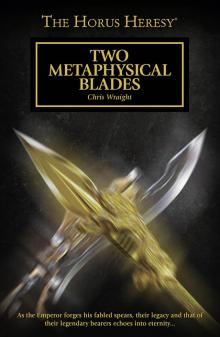 Two Metaphysical Blades
Two Metaphysical Blades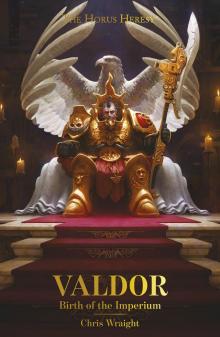 Valdor: Birth of the Imperium
Valdor: Birth of the Imperium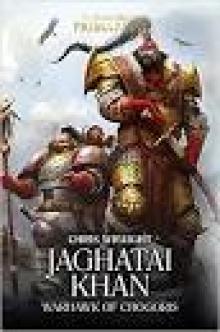 JAGHATAI KHAN WARHAWK OF CHOGORIS
JAGHATAI KHAN WARHAWK OF CHOGORIS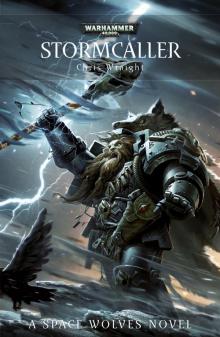 Stormcaller
Stormcaller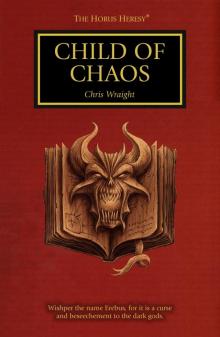 Child of Chaos
Child of Chaos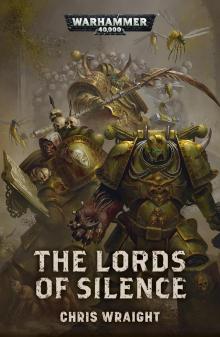 The Lords of Silence
The Lords of Silence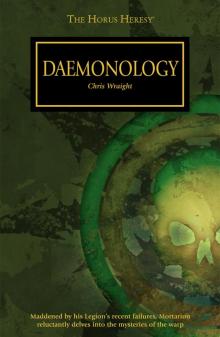 Daemonology
Daemonology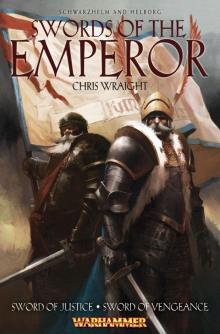 Swords of the Emperor
Swords of the Emperor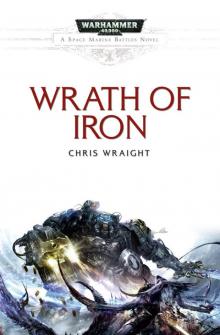 Wrath of Iron
Wrath of Iron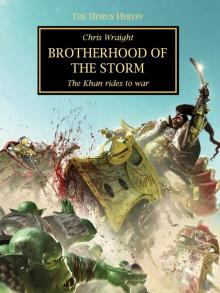 Brothers of the Storm
Brothers of the Storm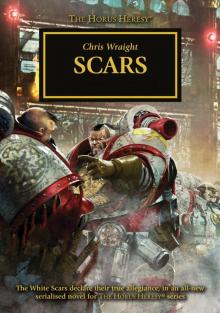 Horus Heresy: Scars
Horus Heresy: Scars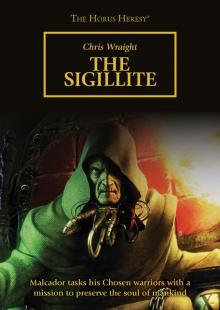 The Sigillite
The Sigillite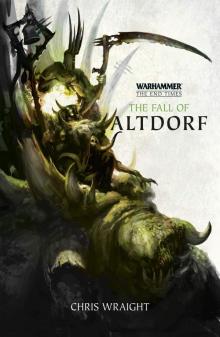 The End Times | The Fall of Altdorf
The End Times | The Fall of Altdorf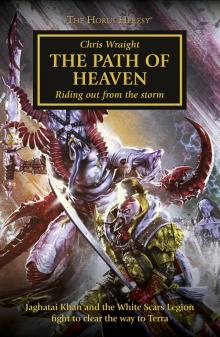 The Path of Heaven
The Path of Heaven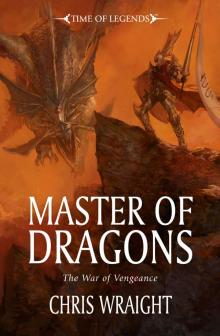 Master of Dragons
Master of Dragons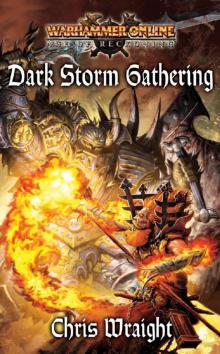 WH-Warhammer Online-Age of Reckoning 02(R)-Dark Storm Gathering
WH-Warhammer Online-Age of Reckoning 02(R)-Dark Storm Gathering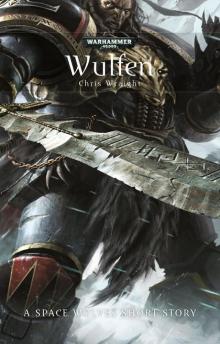 Wulfen
Wulfen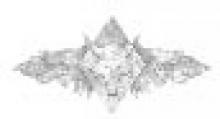 Battle Of The Fang
Battle Of The Fang Onyx
Onyx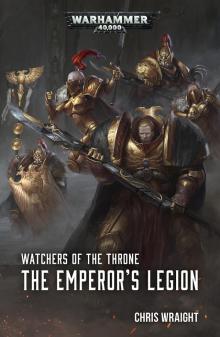 Watchers of the Throne: The Emperor’s Legion
Watchers of the Throne: The Emperor’s Legion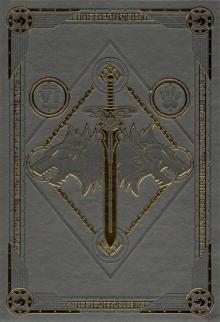 Leman Russ: The Great Wolf
Leman Russ: The Great Wolf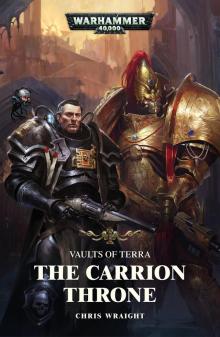 Vaults of Terra: The Carrion Throne
Vaults of Terra: The Carrion Throne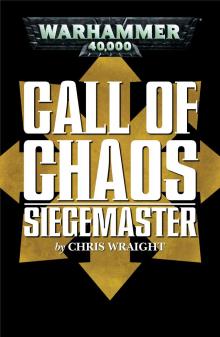 Siegemaster
Siegemaster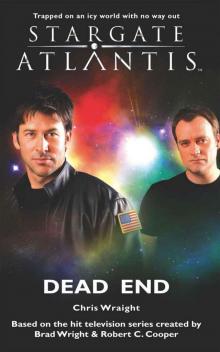 STARGATE ATLANTIS: Dead End
STARGATE ATLANTIS: Dead End Scars
Scars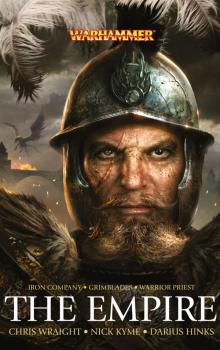 The Empire Omnibus
The Empire Omnibus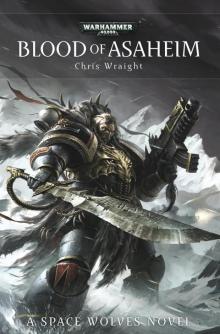 Blood of Asaheim
Blood of Asaheim